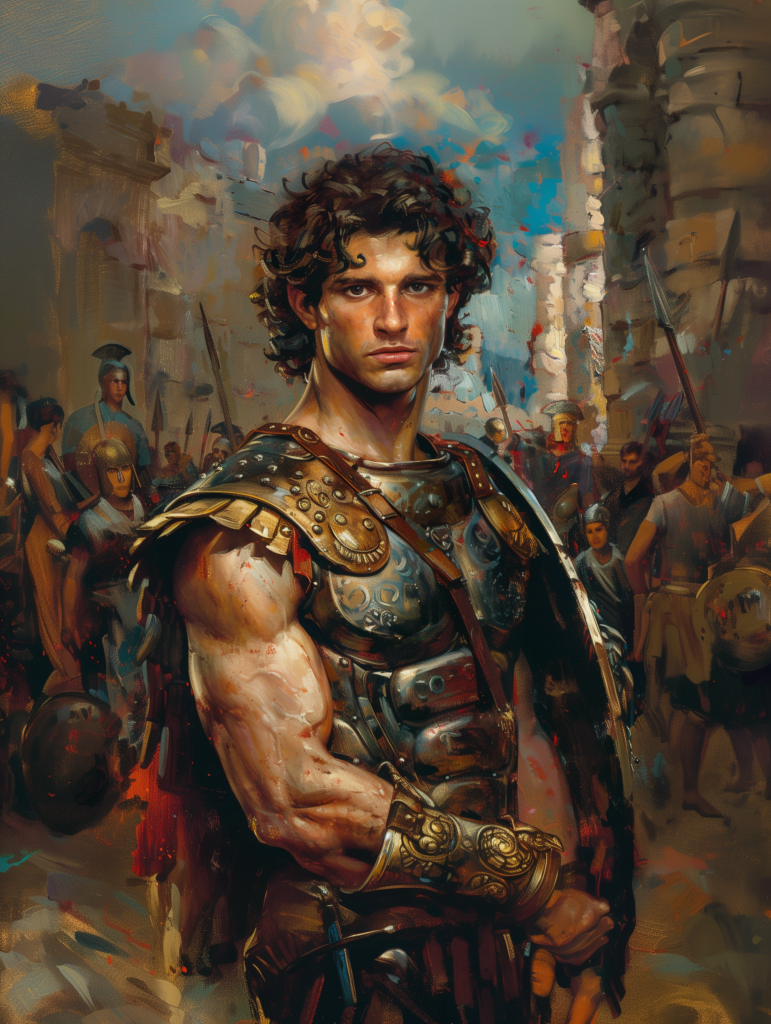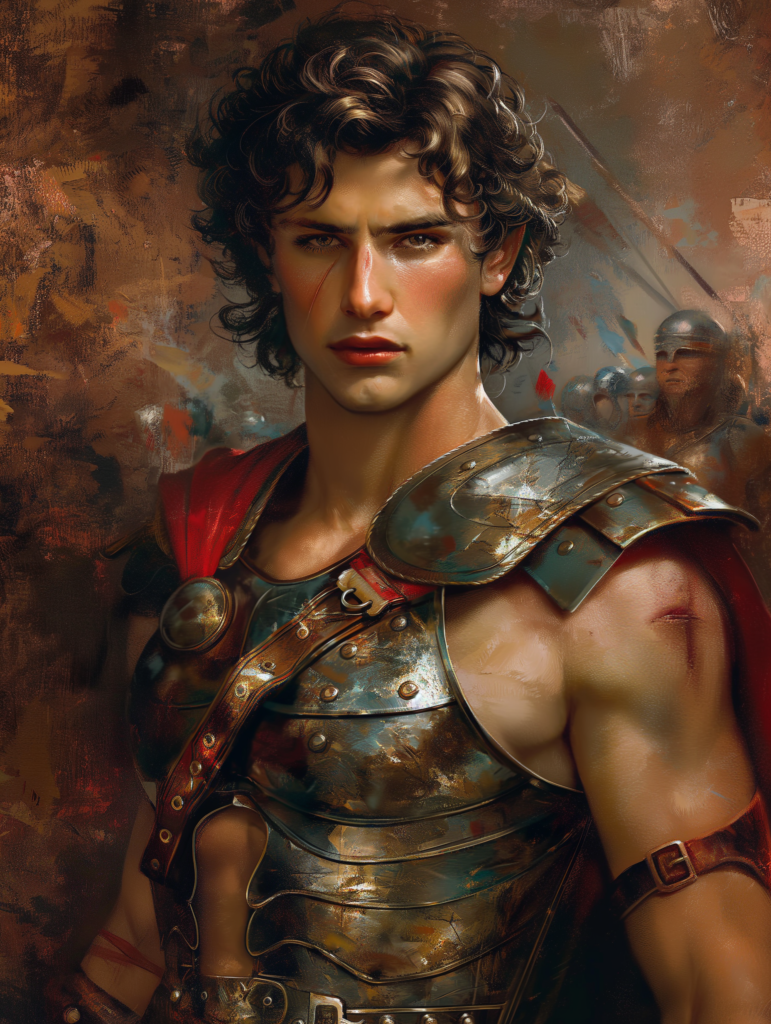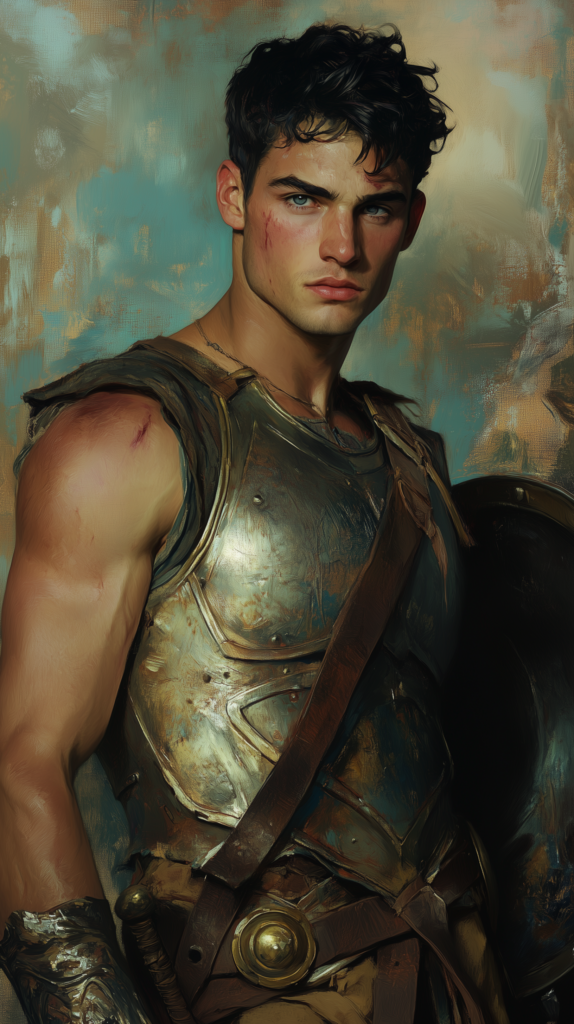Patroclus, Loyal Companion of Achilles
“Discover the untold tale of Achilles’ loyal companion, Patroclus, in this epic journey through friendship, war, and tragedy!”

- Alias: None
- Gender: Male
- Race: Human
- Occupation: Warrior, Companion
- Religion: Hellenic Pantheon
- Allies: Achilles, Greek forces
- Enemies: Trojans
- Abode/Base of Operations: Greek camp during the Trojan War
- Nationality: Greek
- Languages: Ancient Greek
- Alignment: Lawful Good
- Affiliation(s): Greek army, Peleus (Achilles’ father)
- Significant Others: Achilles
Patroclus, a prominent figure in Greek mythology, stands as a beacon of loyalty and friendship amidst the chaos of the Trojan War. He is renowned as the beloved companion of Achilles, the greatest of the Greek warriors. Patroclus, a noble and compassionate soul, finds solace and purpose in his unwavering support of Achilles, whom he considers not just a friend, but a brother.
Born into obscurity, Patroclus’s early years are marked by a tragic accident that leads to his exile from his homeland. Despite this setback, he finds refuge in the household of Peleus, Achilles’ father, where he forms a deep bond with the young warrior-to-be. As they grow up together, Patroclus becomes Achilles’ steadfast companion, offering counsel, support, and unwavering loyalty.
In the midst of the Trojan War, Patroclus’s greatest fear is the loss of Achilles, whom he holds dearer than life itself. Determined to protect and honor his friend, Patroclus dons Achilles’ armor and leads the Myrmidons into battle when Achilles withdraws in protest. His actions are driven by a desire to turn the tide of war and safeguard his comrades, even at the cost of his own life.
Despite his courage and resolve, he harbors doubts and insecurities, fearing that he may not be worthy of Achilles’ friendship or the role he has assumed. Yet, fueled by his unwavering devotion and sense of duty, he presses on, determined to make a difference and fulfill his destiny on the battlefield.
Above all, Patroclus seeks to uphold the values of honor, bravery, and camaraderie that define him as a warrior and a friend. His ultimate goal is not personal glory or fame, but the preservation of his bond with Achilles and the triumph of the Greek cause against the Trojans.
Patroclus 5e
Patroclus 3.5
Patroclus, Loyal Companion of Achilles

Medium humanoid (human), lawful good
Armor Class 17 (breastplate, shield)
Hit Points 136 (16d8 + 64)
Speed 30 ft.
| STR | DEX | CON | INT | WIS | CHA |
|---|---|---|---|---|---|
| 18 (+4) | 14 (+2) | 18 (+4) | 12 (+1) | 14 (+2) | 16 (+3) |
Saving Throws Str +8, Con +8
Skills Athletics +8, History +5, Insight +6, Persuasion +7
Senses passive Perception 12
Languages Common, Ancient Greek
Challenge 10 (5,900 XP)
Actions
Multiattack. Patroclus makes two attacks: one with his spear and one with his shortsword.
Spear. Melee Weapon Attack: +8 to hit, reach 5 ft., one target. Hit: 9 (1d6 + 6) piercing damage.
Shortsword. Melee Weapon Attack: +8 to hit, reach 5 ft., one target. Hit: 8 (1d6 + 4) piercing damage.
Shield Bash. Melee Weapon Attack: +8 to hit, reach 5 ft., one target. Hit: 7 (1d4 + 4) bludgeoning damage. If the target is a creature, it must succeed on a DC 16 Strength saving throw or be pushed 10 feet away and knocked prone.
Reactions
Parry. When a creature Patroclus can see attacks him with a melee attack, he can use his reaction to add +3 to his AC against that attack, potentially causing the attack to miss.
Commander’s Presence. When a friendly creature within 30 feet of Patroclus that can see or hear him makes an attack roll or a saving throw, Patroclus can use his reaction to grant a +2 bonus to the roll.
Equipment
- Spear
- Shortsword
- Shield
- Breastplate
- Magical Item: Shield of Achilles – This magical shield grants Patroclus a +2 bonus to his AC, and he can use a reaction to cast the shield spell without expending a spell slot once per long rest.
- Magical Item: Armor of the Myrmidons – This breastplate armor grants Patroclus resistance to slashing damage and immunity to being charmed or frightened.
Description Patroclus, a distinguished Myrmidon commander, stands tall and resolute, adorned in a finely crafted breastplate and wielding a spear and shortsword with precision. His gaze is steely and commanding, exuding authority and confidence. With his shield raised and ready, he leads his soldiers into battle with unwavering courage and tactical brilliance. His presence on the battlefield inspires loyalty and determination in his comrades, earning him the respect of both allies and adversaries alike.
Patroclus, Loyal Companion of Achilles

Patroclus son of Menoetius, was Achilles best friend.
In his youth, Patroclus killed his friend, Clysonymus, during an argument. His father fled with Patroclus into exile to evade revenge, and they took shelter at the palace of their kinsman King Peleus of Phthia. There Patroclus first met Peleus’ son Achilles. Peleus sent the boys to live in the wilderness and be raised by Chiron, the wise centaur.
Patroclus was older than Achilles. He is listed among the unsuccessful suitors of Helen then of Sparta. Helen instead was given by Tyndareus to Menelaus. All suitors took a most solemn oath to defend the chosen husband against whoever should quarrel with him.
When Achilles refused to fight because of his feud with Agamemnon, Patroclus donned his armor, led the Myrmidons and killed many Trojans, including Sarpedon , and Cebriones. He was killed by Hector and Euphorbos, with help from Apollo.
After retrieving his body, which had been protected on the field by Menelaus and Telamonian Ajax, Achilles returned to battle and avenged his companion’s death by killing Hector. Achilles then desecrated Hector’s body by dragging it behind his chariot instead of allowing the Trojans to honorably dispose of it by burning it. Achilles‘ grief was great and for some time, he refused to dispose of Patroclus’ body; but he was persuaded to do so by an apparition of Patroclus, who told Achilles he could not enter Hades without a proper cremation. Achilles cut a lock of his hair, and sacrificed horses, dogs, and twelve Trojan captives before placing Patroclus’ body on the funeral pyre.
Achilles then organized an athletic competition to honour his dead companion, which included a chariot race (won by Diomedes), boxing (won by Epeios), wrestling (a draw between Telamonian Ajax and Odysseus), a foot race (won by Odysseus), a duel (a draw between Ajax and Diomedes), a
discus throw (won by Polypoites), an archery contest (won by Meriones), and a javelin throw (won by Agamemnon, unopposed).
Trojan War: Roleplaying in the Age of Homeric Adventure
A Mythic Vistas Sourcebook for the d20 System
Written by Aaron Rosenberg
Patroclus is Achilles best friend and chariot driver, and the second in-command of the Myrmidons. He is a handsome man several years older than Achilles, and looks similar to him but not as muscular and with darker hair (light brown instead of blond). Patroclus is more even-tempered than Achilles, in part because he has lesser fighting skills and so less arrogant. He tries to temper his younger friend’s arrogance and console him during his dark moods. He rarely battles on his own, preferring to handle Achilles chariot so Achilles can be free to fight. Everyone likes Patroclus, but he is particularly close with Ajax, Nestor, Odysseus, and Diomedes.
| Patroclus | |
| Male human Charioteer 12 | |
| Medium humanoid | |
| Hit Dice | 12d10+24; hp 90 |
| Initiative | +5 |
| Speed | 25 ft. |
| Armor Class | 26, touch 13, flat-footed 23; |
| Base Attack/Grapple | +12; Grp +15; |
| Attack | +15 melee (1d6+3/17-20, bronze short sword) or +16 ranged (1d8+4, +1 throwing spear); |
| Full Attack | +15 melee (1d6+3/17-20, bronze short sword) or +16 ranged (1d8+4, +1 throwing spear); |
| Space/Reach | 5 ft./5 ft. |
| Special Attacks | sideswipe, wheeled attack. |
| Special Qualities | capture, chariot expertise, gauge skill, skilled horseman, skillful maneuvering, trained steeds, voice command. |
| Saves | Fort +6, Ref +11, Will +6. |
| Abilities | Strength 16, Dexterity 16, Constitution 14, Intelligence 11, Wisdom 14, Charisma 16. |
| Skills | Balance +2, Boat +4, Concentration +5, Drive +12, Handle Animal +8, Intimidate +8 (+12 against commoners), Jump +3, Knowledge (tactics) +9, Ride +7, Swim 6 |
| Feats | Chariot Attack*B, Chariot Shield*, Chariot Specialization*, Drive-By Attack*B, Improved Critical (short sword), Noble*, Pious*, Point Blank Shot. |
| Environment | – |
| Organization | – |
| Challenge Rating | 12 |
| Treasure | – |
| Alignment | Lawful Good |
Possessions: bronze panoply, +1 round bronze shield, bronze short sword, +1 throwing spear.
Note Patroclus does not have his own chariot at Troy, but is Achilles charioteer and can treat the Golden Chariot drawn by Balius and Xanthus as his own.
Patroclus’s Story

Patroclus, a hero of the Trojan War, was more than just a companion to Achilles; he was a figure of great significance and tragedy in Greek mythology. As a child, Patroclus accidentally killed another boy during a game and was subsequently exiled from his homeland. He found refuge in the house of Peleus, Achilles’ father, where he grew up alongside Achilles and became his closest friend and confidant.
During the Trojan War, when Achilles withdrew from the battlefield due to a dispute with Agamemnon, Patroclus donned Achilles’ armor and led the Myrmidons into battle to push back the Trojan forces. However, Patroclus’s actions led to his demise when he was slain by the Trojan prince Hector. His death spurred Achilles to rejoin the war with a vengeance, ultimately leading to Hector’s downfall.
Despite the lack of explicit romantic portrayal in Homer’s Iliad, some later interpretations suggest a deeper bond between Achilles and Patroclus. Their relationship, whether platonic or romantic, has inspired countless literary works and remains a poignant symbol of loyalty, friendship, and sacrifice.

 Buy me a coffee
Buy me a coffee